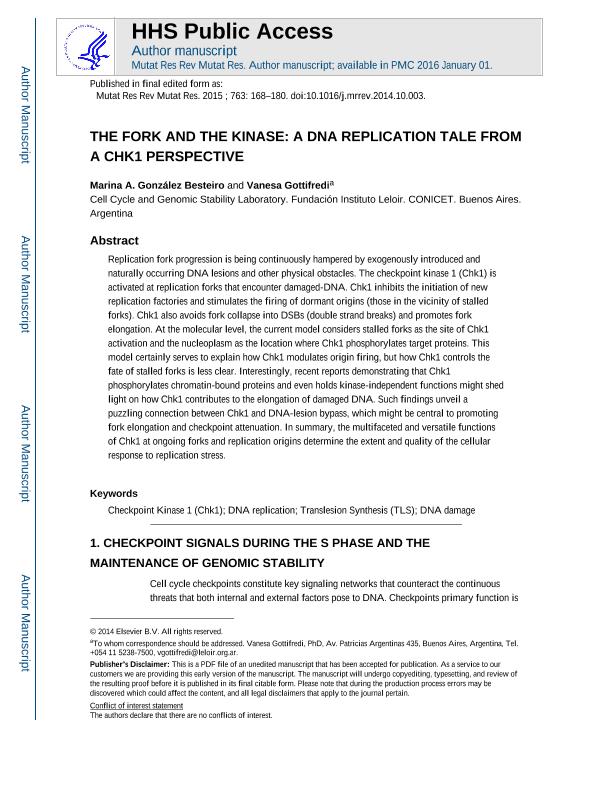Mostrar el registro sencillo del ítem
dc.contributor.author
González, Marina Alejandra

dc.contributor.author
Gottifredi, Vanesa

dc.date.available
2016-12-16T21:21:20Z
dc.date.issued
2015-01
dc.identifier.citation
González, Marina Alejandra; Gottifredi, Vanesa; The fork and the kinase: A DNA replication tale from a CHK1 perspective; Elsevier Science; Mutation Research. Reviews In Mutation Research; 763; 1-2015; 168-180
dc.identifier.issn
1383-5742
dc.identifier.uri
http://hdl.handle.net/11336/9659
dc.description.abstract
Replication fork progression is being continuously hampered by exogenously introduced and naturally occurring DNA lesions and other physical obstacles. Checkpoint kinase 1 (Chk1) is activated at replication forks that encounter damaged DNA. Subsequently, Chk1 inhibits the initiation of new replication factories and stimulates the firing of dormant origins (those in the vicinity of stalled forks). Chk1 also avoids fork collapse into DSBs (double strand breaks) and promotes fork elongation. At the molecular level, the current model considers stalled forks as the site of Chk1 activation and the nucleoplasm as the location where Chk1 phosphorylates target proteins. This model certainly serves to explain how Chk1 modulates origin firing, but how Chk1 controls the fate of stalled forks is less clear. Interestingly, recent reports demonstrating that Chk1 phosphorylates chromatin-bound proteins and even holds kinase-independent functions might shed light on how Chk1 contributes to the elongation of damaged DNA. Indeed, such findings have unveiled a puzzling connection between Chk1 and DNA lesion bypass, which might be central to promoting fork elongation and checkpoint attenuation. In summary, Chk1 is a multifaceted and versatile signaling factor that acts at ongoing forks and replication origins to determine the extent and quality of the cellular response to replication stress.
dc.format
application/pdf
dc.language.iso
eng
dc.publisher
Elsevier Science

dc.rights
info:eu-repo/semantics/openAccess
dc.rights.uri
https://creativecommons.org/licenses/by-nc-sa/2.5/ar/
dc.subject
Chk1
dc.subject
Dna Replicación
dc.subject
Replication Origins
dc.subject
Fork Elongation
dc.subject.classification
Biología Celular, Microbiología

dc.subject.classification
Ciencias Biológicas

dc.subject.classification
CIENCIAS NATURALES Y EXACTAS

dc.title
The fork and the kinase: A DNA replication tale from a CHK1 perspective
dc.type
info:eu-repo/semantics/article
dc.type
info:ar-repo/semantics/artículo
dc.type
info:eu-repo/semantics/publishedVersion
dc.date.updated
2016-12-16T17:27:17Z
dc.journal.volume
763
dc.journal.pagination
168-180
dc.journal.pais
Países Bajos

dc.journal.ciudad
Amsterdam
dc.description.fil
Fil: González, Marina Alejandra. Consejo Nacional de Investigaciones Científicas y Técnicas. Oficina de Coordinación Administrativa Parque Centenario. Instituto de Investigaciones Bioquimicas de Buenos Aires; Argentina. Fundación Instituto Leloir; Argentina
dc.description.fil
Fil: Gottifredi, Vanesa. Consejo Nacional de Investigaciones Científicas y Técnicas. Oficina de Coordinación Administrativa Parque Centenario. Instituto de Investigaciones Bioquimicas de Buenos Aires; Argentina. Fundación Instituto Leloir; Argentina
dc.journal.title
Mutation Research. Reviews In Mutation Research

dc.relation.alternativeid
info:eu-repo/semantics/altIdentifier/url/http://www.sciencedirect.com/science/article/pii/S1383574214000672
dc.relation.alternativeid
info:eu-repo/semantics/altIdentifier/doi/http://dx.doi.org/10.1016/j.mrrev.2014.10.003
dc.relation.alternativeid
info:eu-repo/semantics/altIdentifier/url/https://www.ncbi.nlm.nih.gov/pmc/articles/PMC4369321/
Archivos asociados
